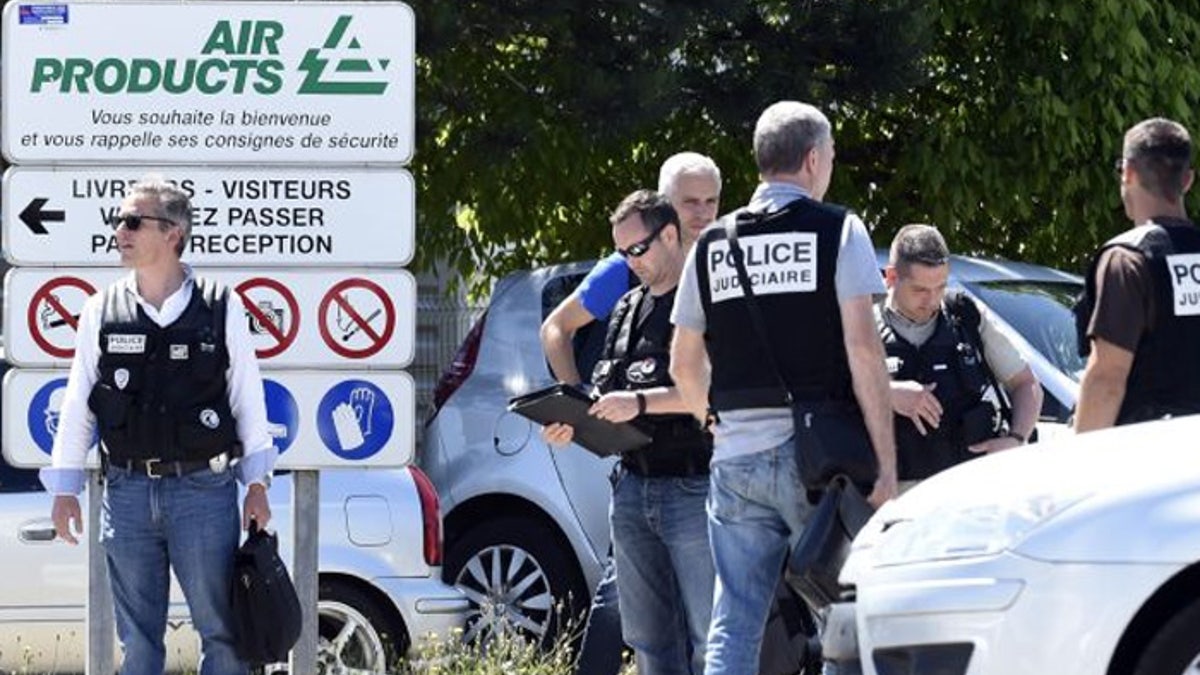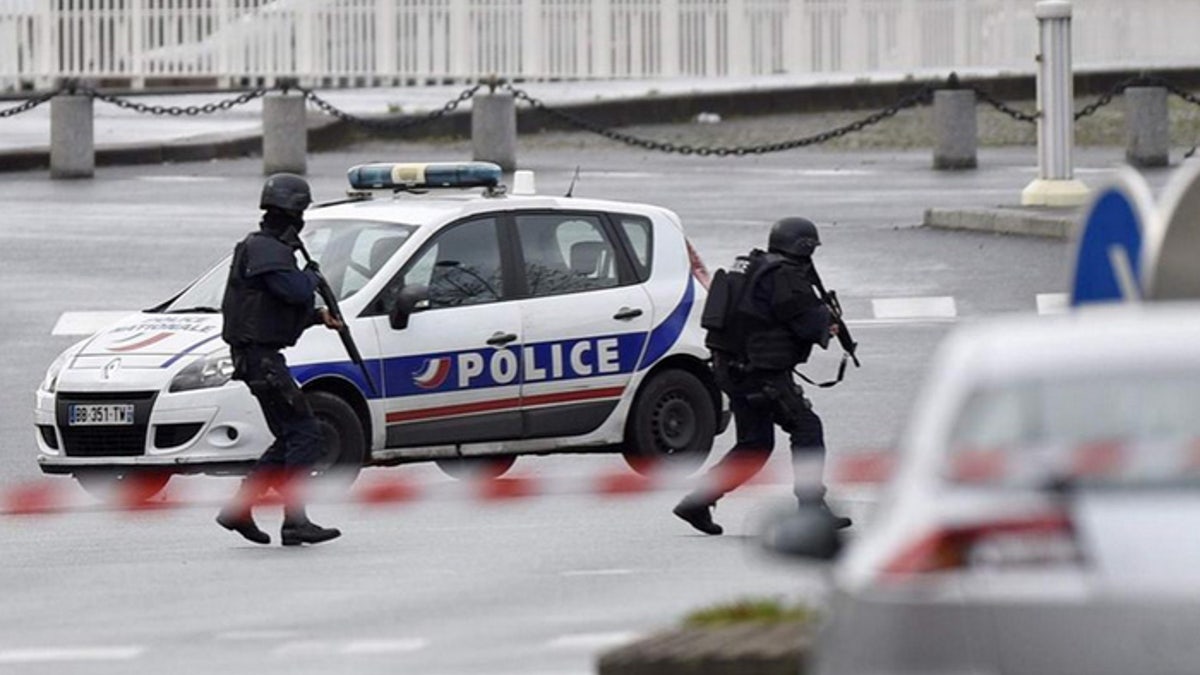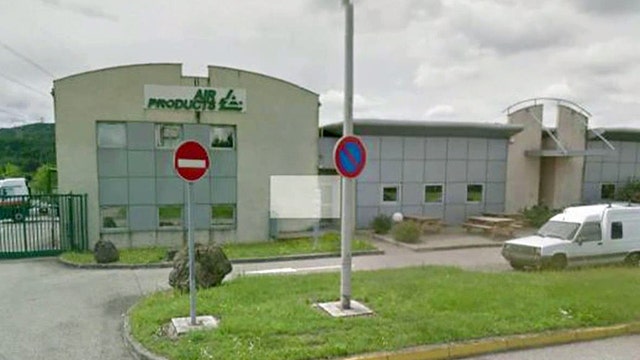Terrorists gunned down dozens of tourists on a Tunisian beach, left a severed head atop a fence outside a French factory and blew up a Kuwaiti mosque Friday in a bloody wave of attacks that followed an ISIS leader’s call to make the month of Ramadan a time of "calamity for the infidels."
There was no confirmation that the attacks were a coordinated effort ordered by ISIS, but the suspects who attacked a U.S.-owned gas factory in southeastern France left the terrorist army's flags next to the severed head of their victim, and an ISIS affiliate claimed responsibility for the deadly Kuwait blast.
If the attacks were indeed an answer to ISIS spokesman Abu Muhammad al-Adnani's recent call for savagery, it would represent a hideous perversion of Islam's most holy period, which began June 17 and ends July 17.
“While we’re still working to determine whether the attacks were coordinated or directed by ISIL (Islamic State), they bear the hallmarks that have defined ISIL’s violent ideology or those inspired by such hatred. There is no doubt that ISIL poses a continuing threat, and we remain concerned about its ability to direct or inspire attacks beyond Iraq and Syria,” A U.S. official told Fox News Friday.
"The attack was of a terrorist nature since a body was discovered, decapitated and with inscriptions."
Jihadists should make Ramadan a time of "calamity for the infidels ... Shi'ites and apostate Muslims," Al-Adnani said in a recent audio message. "Muslims everywhere, we congratulate you over the arrival of the holy month. Be keen to conquer in this holy month and to become exposed to martyrdom."
The attack in France occurred first, Friday morning in Saint-Quentin-Fallavier, northwest of the Alpine city of Grenoble. Two suspects dressed as deliverymen crashed a car into an industrial gas plant operated by Allentown, Pa.,-based Air Products & Chemicals, stormed inside and killed at least one person. The head of the victim was left on a fence, with Arabic phrases scrawled on it and ISIS flags nearby, Sky News reported, citing French legal sources.
The unnamed victim was a businessman at a local transportation company and the boss of a man arrested in connection with the attack.
Nearly simultaneously, a gunman opened fire with an automatic rifle on a beach in Sousse-- a Tunisian coastal town popular with tourists-- killing at least 37 and wounding 36. The Health Ministry said the dead include Tunisians, Brits, Germans and Belgians.
A third attack killed at least 25 and wounded more than 200 in a Shia mosque in Kuwait City, the Ministry of Interior said. A suicide bomber purportedly from ISIS affiliate Najd Province targeted Shiite worshippers after midday prayers at the Imam Sadiq Mosque in the residential neighborhood of al-Sawabir in Kuwait's capital, Kuwait City. It was the first terrorist attack in Kuwait in more than two decades.
ISIS is comprised of Sunni Muslims, and its members have a long and bloody history with Shia Muslims, as evidenced by Al-Adnani's call. The attack came immediately following Friday prayers. There was no claim of responsibility, but ISIS has claimed responsibility for bombings at two different Shiite mosques in Saudi Arabia in recent weeks.
French officials wasted no time labeling Friday's attack an act of terrorism.
"The attack was of a terrorist nature since a body was discovered, decapitated and with inscriptions," French President Francois Hollande told a news conference in Brussels, where he cut short his attendance at an EU summit to return to France.
Hollande and his Tunisian counterpart Beji Caid Essebsi expressed “solidarity in the face of terrorism,” according to a statement by Hollande’s office, France24.com reported.
Interior Minister Bernard Cazeneuve said at least one man--a 30-year-old extremist known to authorities named Yassin Sahli-- was under arrest following the France attack. The suspect from Lyon was seized by an alert firefighter.
Other people, including the man's wife, were also taken into custody after the attack, A second suspect arrested at his home in Saint-Quentin-Fallavier was reportedly seen driving back and forth past the factory before the attack, the Dauphine Libere newspaper reported. A manhunt is underway for any other suspects involved.
Minister Cazeneuve, speaking from the scene, described the attack as "barbarous" and a "terrible terrorist crime." He said the suspect had been known to foreign intelligence services since 2006, but that police monitoring of him had ceased in 2008. The man did not have a criminal record, the minister added.

The attack closely mirrored ISIS propaganda threats. (Reuters)
French authorities told Fox News that approximately 10 people were injured.
The factory is operated by Air Products & Chemicals, an Allentown, Pa.,-based company that makes industrial gases.
"Our priority at this stage is to take care of our employees, who have been evacuated from the site and all accounted for," the company said in a statement. "Our crisis and emergency response teams have been activated and are working closely with all relevant authorities."
A local official confirmed the nation is on high alert.
"The terrorism threat is at a maximum," Alain Juppe, mayor of Bordeaux, told Fox News.
The United Nations, the U.S and other countries condemned Friday’s attacks. U.N. Secretary-General Ban Ki-moon said those "responsible for such appalling acts of violence must be swiftly brought to justice" and Interpol offered its help to all three nations.
In Washington, Pentagon spokesman Col. Steve Warren said it was too soon to tell whether the three attacks were the work of Islamic State extremists but added "we unequivocally condemn these terrorist attacks.
Terrorism analysts said the attacks could be so-called “lone wolves” answering the call to attack ISIS enemies during the holy period.

French President Francois Hollande said extra police were immediately deployed at industrial sites around the nation following Friday's attack. (Reuters)
“It is very likely that ISIS' supporters acted due to the call for attacks during Ramadan,” said Ryan Mauro, of the New York-based terrorism research institute Clarion Project. “It is appealing to ISIS supporters on a personal level because it gives their attacks some more religious significance.”
"Terrorists could look to the attacks, recent ISIL leadership statements, or other markers—such as last year’s declaration of its so-called caliphate—to spur additional violence,” the U.S. official said.
France's anti-terrorism prosecutor has opened an investigation into the incident. The country went on high alert after a series of attacks in January that left 20 people dead in and around Paris region, including the Islamic terrorists. In the Jan. 7 attack at the satirical magazine Charlie Hebdo, two radical Muslim brothers, Saïd and Chérif Kouachi, heavily armed and incensed over the publishing of caricatures of Muhammad, stormed the magazine's offices and killed 12, including staffers and a police officer.
Authorities hunted down the Kouachi brothers for three days, until finally cornering them in a Paris printing house and killing them in a shootout. As police searched for the brothers’, a friend and fellow home grown Islamic terrorist Amedy Coulibaly, took at least 15 people hostage at a kosher supermarket in Paris. After a long standoff, police stormed the market, killing him. Four hostages were also killed in the incident.
Ramadan is the ninth month of the Islamic lunar calendar when Muslims celebrate the Koran. They also often fast-- primarily from eating and drinking-- from sunrise to sunset every day of the month to teach empathy for those who have less. Fasting and reading the Koran during Ramadan should encourage charity, kindness and social justice, especially to the needy and poor.
Fox News Channel's Catherine Herridge and The Associated Press contributed to this report.

